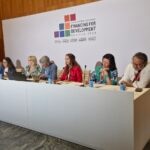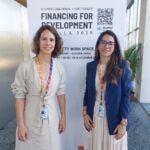The BBVA Microfinance Foundation, a benchmark in private financing for development
Within the framework of the 4th International Conference on Financing for Development (FFD4), held from June 30 to July 3 in Seville, the BBVA Microfinance Foundation (FMBBVA) is strengthening its position as a benchmark in development financing from the private sector. Of special note is its commitment to technological innovation to promote the progress of vulnerable entrepreneurs.

Since its creation in 2007, the FMBBVA entities in five Latin American countries have served more than 6 million low-income entrepreneurs, disbursing more than $21 billion in loans to help them progress. These entrepreneurs, who are in a situation of socioeconomic vulnerability, require specific financing and support to overcome poverty.
The FFD4, organised by the United Nations, brings together governments, multilateral organisations, financial institutions, the private sector and civil society with the aim of establishing a new global financing framework to accelerate the implementation of the Sustainable Development Goals (SDGs). In a global context of stagnation in poverty and hunger reduction, the conference seeks concrete solutions to mobilise more and better resources for development.
Innovative models for greater impact
Stephanie García Van Gool, Director of Impact Measurement and Strategic Development at the BBVA Foundation, explained how innovation is key to offering comprehensive solutions that go beyond traditional financing, in the session ‘Philanthropic financing as a catalyst for development.’ She also explained how the Foundation focuses on addressing the multidimensional needs of those who have the least: "Financing the development of entrepreneurs who are most vulnerable and who lack access to financial products and services. We offer innovative solutions that enable them to grow their businesses, improve their livelihoods and access education."
In this regard, the FMBBVA stands out as the first private entity to use the Oxford University's multidimensional poverty measurement methodology, which is used by more than 100 countries, to design products and services tailored to the real needs of entrepreneurs, addressing not only the lack of income, but also deficiencies in access to training, security, or basic sanitation in the home. Examples of this product innovation include affordable health insurance and specific loans for the installation of toilets or the replacement of earthen floors with healthier materials.
Technology for financial inclusion
Gabriela Eguidazu, Director of Innovation and Inclusive Growth at the Foundation, was another speaker at the session entitled ‘The role of banking in financing inclusive economies’, organised by the United Nations. In her speech, Eguidazu detailed the innovative models developed by the BBVAMF, based on the strategic use of technology and data to ensure that the most vulnerable entrepreneurs are not left behind in the digitalisation of their management and businesses.
Among these technological innovations are: mobile banking with state-of-the-art functionalities, such as biometric authentication and access to immediate transfers; the use of generative artificial intelligence to reinforce the accompaniment and personalised advice to entrepreneurs; as well as the application of advanced data models for the development of a highly personalised value offer, adapted to the individual needs of each entrepreneur. Other innovations highlighted were the open and free online educational platforms to strengthen their digital literacy and entrepreneurial skills.
Within the framework of the FFD4, the BBVA Microfinance Foundation also co-organised an event during the preparatory process with the United Nations Development Programme (UNDP) and the Government of Colombia, and participated in the seminar "Financing development with a feminist approach: counting on women", where Laura Fernández Lord, head of Sustainability, Equity and Inclusion at BBVAMF, highlighted the importance of the gender perspective, pointing out that "63% of the entrepreneurs who have a loan with us are women."

Stephanie García Van Gool (left) and Gabriela Eguidazu (right), from FMBBVA.
With its active participation in the Conference and its commitment to innovation and technology, BBVAMF reaffirms its commitment to reducing poverty and improving lives, demonstrating that the role of the private sector in the design of advanced solutions is fundamental for sustainable development.
The BBVA Group is also present in this FFD4 with the participation of Iván Poza, sector manager for Public Institutions and Sovereign Wealth Funds at BBVA, in panels where he will talk about mobilizing private climate finance in emerging markets and developing economies, or about building resilience through sustainable finance in Latin America and the Caribbean. Iván Poza highlighted the importance of blended finance and the solutions provided by the private sector for climate and development goals. Toni Ballabriga, Global Head of Sustainability Intelligence at BBVA, is also scheduled to participate in a panel on financing an equitable, fair, inclusive and resilient future.
Technology for financial inclusion
Gabriela Eguidazu, Director of Innovation and Inclusive Growth at the Foundation, was another speaker at the session entitled ‘The role of banking in financing inclusive economies’, organised by the United Nations. In her speech, Eguidazu detailed the innovative models developed by the BBVAMF, based on the strategic use of technology and data to ensure that the most vulnerable entrepreneurs are not left behind in the digitalisation of their management and businesses.
Among these technological innovations are: mobile banking with state-of-the-art functionalities, such as biometric authentication and access to immediate transfers; the use of generative artificial intelligence to reinforce the accompaniment and personalised advice to entrepreneurs; as well as the application of advanced data models for the development of a highly personalised value offer, adapted to the individual needs of each entrepreneur. Other innovations highlighted were the open and free online educational platforms to strengthen their digital literacy and entrepreneurial skills.
Within the framework of the FFD4, the BBVA Microfinance Foundation also co-organised an event during the preparatory process with the United Nations Development Programme (UNDP) and the Government of Colombia, and participated in the seminar "Financing development with a feminist approach: counting on women", where Laura Fernández Lord, head of Sustainability, Equity and Inclusion at BBVAMF, highlighted the importance of the gender perspective, pointing out that "63% of the entrepreneurs who have a loan with us are women."